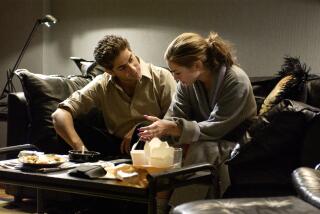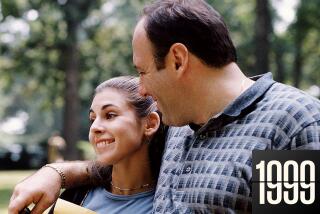Revisiting Scorsese’s Classic ‘Mean Streets’
To see Martin Scorsese’s “Mean Streets” nearly 25 years ago was to be blown away by a film that confirmed a major talent with only two features behind him.
A year earlier Francis Ford Coppola had created an epic crime family saga with “The Godfather,” but though “Mean Streets” covered some of the same territory, it had a whole different feel. “Mean Streets” is a jazzy riff of a movie, zigging and zagging as if to the beat of snapping fingers. Its greatness lies in its leanness, with nary a word, a move, a gesture that’s nonessential.
To come to the film again, after a quarter of a century, is to appreciate the innate sense of structure and pace--not to mention spontaneity--with which Scorsese sustains the career-making portrayals of Harvey Keitel and Robert De Niro. Framed by Little Italy’s’ annual weeklong Festa di San Gennaro, “Mean Streets”--which screens with a fresh print one week at the Nuart--moves with the inevitability of “Oedipus Rex.”
Its by-now-familiar story is that of a young man trying hard to do the right thing. Keitel’s Charlie is conscientious in his duties as a numbers runner for his suave racketeer uncle Giovanni (the late Cesare Danova), but as a devout yet questioning Catholic he experiences profound spiritual longing. That he takes the belief that he is his brother’s keeper seriously propels the film’s plot--and determines his destiny. The guy Charlie feels responsible for, however, is De Niro’s Johnny Boy, a crude, none-too-swift loose cannon (who might have have taken a vicious beating that was intended for Charlie).
Johnny Boy is the last person you want to be involved with if you’re Charlie, who dreams of escaping the life of a low-level criminal and opening his own restaurant. Johnny Boy can be amusingly goofy--”Mean Streets” has a great deal of humor before it turns pitch-dark--but he’s a hothead with a defiant, rebellious spirit. Complicating matters is that Charlie is having an affair with his neighbor, the lovely, willowy Teresa (Amy Robinson). That she happens to be epileptic--and also Johnny Boy’s cousin--are two strikes against her in the eyes of Giovanni.
Significantly, Teresa, who is in love with Charlie, is the only major female character in the film. She differs from him and his friends in that she is able to see beyond the stifling, destructive confines of Little Italy underworld life and begs Charlie to move with her to an apartment uptown.
Relentlessly conflicted, Charlie fiercely embraces the traditional; he probably has more depth than Teresa but he’s also more naive. He’s so deeply in the clutches of Italian-American Roman Catholic culture that he’s become, way beyond the grasp of his cohorts, a kind of mystic--he even quotes William Blake and is frequently tempted to touch fire.
Shot in shadowy, muted color by Kent Wakeford, “Mean Streets” is arguably the prototypical male-bonding movie, copied endlessly right down to the present. It takes place much of the time in a dimly lit bar run by Charlie’s pal Tony (David Proval), and the volatile mix of camaraderie and violence anticipates much of Scorsese’s “GoodFellas”--even down to a couple of audacious tracking shots. Richard Romanus is very effective as an older and even tougher member of the group. David Carradine, who starred in Scorsese’s second feature, “Boxcar Bertha,” and his brother Robert turn up in a bloody vignette, and Scorsese’s late mother, Catherine, puts in an appearance as she does in other of her son’s films. (Scorsese himself can be glimpsed in the back seat of Romanus’ car at the film’s most crucial moment.)
It’s heartening that Scorsese, Keitel and De Niro went on to careers of such formidable accomplishment. Even this early, Keitel and De Niro were actors of tremendous wit, imagination and energy. It’s a quality they share with Scorsese, a then-recent New York University film alumnus who expresses his love of the movies and their unique power of expression with nods to John Ford’s “Donovan’s Reef,” Roger Corman’s “Tomb of Ligeia” and Fritz Lang’s “The Big Heat.”
When “Mean Streets” opened in October 1973, it was a thrill to review it and praise it as “an unqualified triumph.” To re-review is to celebrate a modern American screen classic.
* MPAA rating: R. Times guidelines: It includes much strong language, some strong violence, some nudity.
‘Mean Streets’
Harvey Keitel: Charlie
Robert De Niro: Johnny Shep
Amy Robinson: Teresa
David Proval: Tony
Richard Romanus: Michael
Cesare Danova: Giovanni
A Warner Bros. presentation. Director Martin Scorsese. Producer Jonathan T. Taplin. Executive producer E. Lee Perry. Screenplay by Scorsese and Mardik Martin. Cinematographer Kent Wakeford. Editor Sid Levin. Costumes Norman Falling II. Art director William Sandel. Running time: 1 hour, 50 minutes.
*
* Exclusively at the Nuart through Thursday, 11272 Santa Monica Blvd., West Los Angeles, (310) 478-6379.
More to Read
Only good movies
Get the Indie Focus newsletter, Mark Olsen's weekly guide to the world of cinema.
You may occasionally receive promotional content from the Los Angeles Times.










